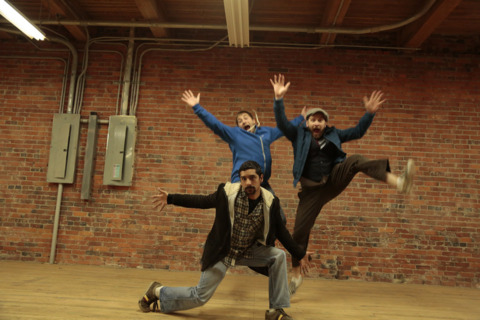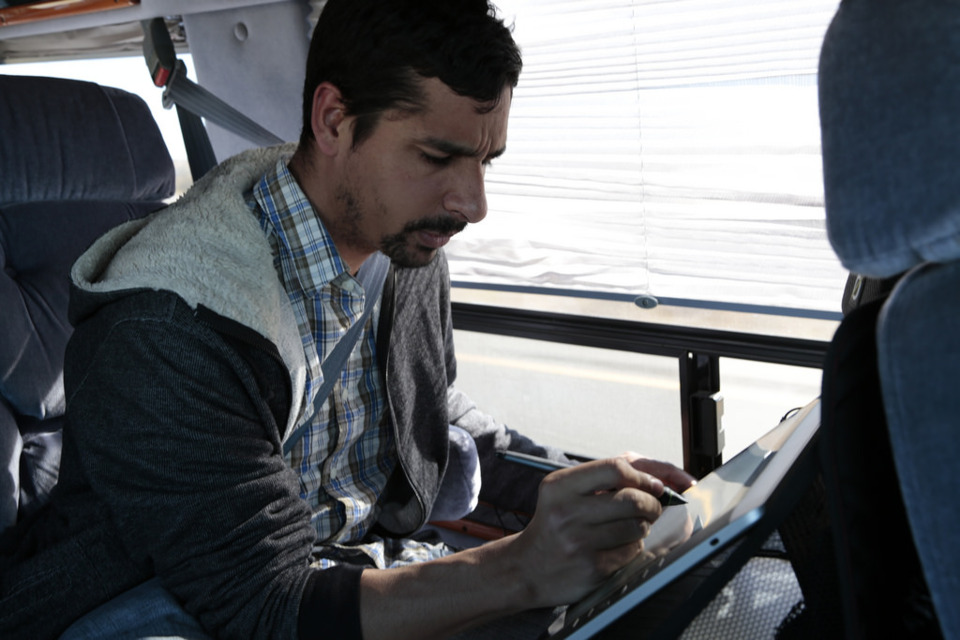Perhaps the most radical move a developer could make is going from years crafting games with multi-million dollar budgets to traveling the country and making them in a van. That’s Binary Solo’s Indie Van Game Jam.

Programmer Chad Stewart, artist Diego Almazan, and designer Zeb West previously worked on BioWare’s Star Wars: The Old Republic in Austin, Texas. Some left on their own, others laid off as the development staff started to contract after release.
“A lot of this was inspired by the fact that I did want to travel and get out there in some form,” said Stewart.
The project first tried to get off the ground with an ambitious $50,000 pitch on Kickstarter, but the proposal didn’t manage to raise more than $5,000. Instead, the team decided to go on their own, and make Indie Van Game Jam happen anyway. The first episode went live last month, in which the trio travels from Austin to Chicago to visit designer Rob Lach. The team’s task is to build a game in the time it takes to drive to their destination city, and all the work happens inside of a stuffy van.
“We settled on a conversion van,” said West, “the ones with a ladder on the back and an extended roof space on top that’s got sweet wood panelling and track lighting and a console with an old CRT in there. And it came with a VCR that didn't work.”
In reality, Stewart’s pointed out that it was probably fortuitous the VCR didn’t work, since the only movies brought along were The Last Unicorn and Indiana Jones and the Last Crusade.
“The tapes were a little sacrilegious for our journey,” said Stewart. “They were all final! Last crusade! It would have ended us if it worked!”
Once in the van, the team found the biggest problem was the sheer logistics of sharing files with one another. At most studios, developers use version control software to ensure changes made to the game can be tracked, monitored, and recorded. This prevents people from doing something twice, deleting work, and generally making it easier to understand where the project is headed. Without everyone on the same network, this quickly became a nightmare. Their solution? Share USB sticks. That didn't really work.
The group later purchased a wireless hard drive. (That also didn't really work.)
“We were editing the second episode, and there’s this moment where I have two windows open,” said West. “One is my local version of the game, one is the version that’s on the hard drive, and I just start deleting what I think is my version of the game, so that I can copy the fresher version on. But I started deleting the wrong one, and there’s this moment where I stop, turn to Chad, and [go] ‘I think I really fucked up.’ [laughs] I crapped my pants in that moment.”

It’s Not Me, It’s You was the game Binary Solo made while en route to the Windy City.
“This game challenges the concept of a first person shooter. It's Not Me, It's You puts the player in the role of plane crash survivor in the midst of a bizarre experience.”
You can download the game right now, and the others will be available as new episodes go live.
One of the big reasons motivating Binary Solo to start travelling and meeting other developers was trying to establish what the term “indie” even means in 2014. While Valve is technically indie, it doesn't really seem to embody the same spirit of the developers featured in, say, Indie Game: The Movie.
“To me, a lot it has to do with that creative spirit,” said Almazan. “Especially for smaller groups, a lot of it for me has to do with small groups. When you embark on a project, when you start something, it becomes that much more personal, compared to something like a triple-A thing, where there’s all these people involved. Everybody’s only got a very tiny piece of it that they’re responsible for, and it’s very difficult to see everything else. Very, very compartmentalized. Very sterile. Whereas for what we consider indie is very intimate, very fluid. There’s a very focused vision about what it’s trying to be.”
“It feels great to show people how things are so fluid and they change all the time. I feel like it can illuminate why big companies don’t always say everything that’s going on."
The Old Republic was a monstrous project with a lengthy development, and big budget games are notorious for keeping process a secret. Indie Van Game Jam is the opposite, with games both being designed and the entire creative process being laid out for viewers to see. This type of performative design has become much more common in the past year or so, with both Double Fine and Vlambeer often filming or live streaming the creation of its projects.
Though Binary Solo's embracing its freedom, it understands why companies aren't willing to spill everything.
“It feels great to show people how things are so fluid and they change all the time,” said Stewart. “I feel like it can illuminate why big companies don’t always say everything that’s going on. There is a lot going on, and it seems like ‘oh, maybe they don’t know everything every minute, until the release date, what’s gonna happen.' Big companies don’t want to put out that perception of 'well, things could change, and we’re doing things as the come, we have problems.' They want to seem like they’re put together, and they've crafted this best experience for you.”
That’s often not the case with smaller, independently-made games in 2014, in which many developers are leveraging the ability to personalize themselves and the games they’re making.
“With a game jam, you can experiment with a lot of these things, and get a feel [for it]” said Almazan. “It’s okay to have things that don’t quite work because it just doesn't feel so permanent. It’s a chance to get your hands dirty and look at all the possibilities.”
You can watch the first episode of Indie Van Game Jam below:
A few other notes:
- What are your thoughts on the term "indie"? The struggle over coming up with a definition seems to have died down, but remains a term we throw around without much thought behind why we do it.
- I really like the fact that these guys decided to just go for it, even though their Kickstarter failed. I'm sure that's not possible for everyone, but it's cool.
- It's hard to imagine what it would be like if a major game developer decided to be as open as Double Fine. One can dream, though.